Engaged Anthropology Grant: Jacob Doherty
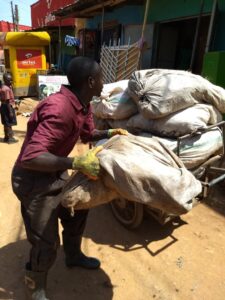
In 2012 Jacob Doherty received a Dissertation Fieldwork Grant to aid research on ”Keep Kampala Clean: Disposability, Environmentalism, and Garbage in Urban Uganda,” supervised by Dr. James Ferguson. In 2018 Dr. Doherty was able to return to his fieldsite when he was awarded an Engaged Anthropology Grant which gave him the opportunity to carry out his project, “Wasted Opportunities: Designs to Recognize Informal Waste Infrastructures in Kampala, Uganda”.
Using a small cart he designed and built himself, Didas collects rubbish from households throughout Banda, a mixed-income neighborhood in Uganda’s capital city, Kampala. Filling a vital gap in waste management, he collects from houses large and small, rich and poor, from hostels housing dozens of students at the nearby university who benefit from the customized services he provides to mutli-occupancy households who cannot afford regular collection by private firms. For the last year however, he has been working under the cover of darkness, serving his clients at night to avoid the attention of representatives of a large private firm awarded a contract to serve Banda by the city government. Mistaking their contract for sole territorial rights to the neighborhood’s rubbish, they have impounded Didas’s equipment and threatened to take him to court. This fits with a broader pattern in Kampala, where small-scale garbage collectors who provide critical infrastructural services are being criminalized, paradoxically, in the name of cleaning of the city.
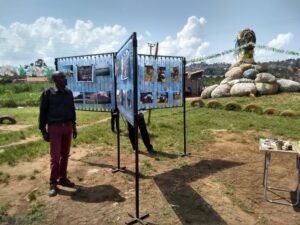
Didas was one of my key collaborators on “Wasted Opportunities: Designs to Recognize Informal Waste Infrastructures in Kampala, Uganda,” an exhibition I co-organized with ECOaction, a community organization based in Banda that works to tackle Kampala’s environmental and employment challenges by using waste to generate new livelihoods. Lead by eco-artist Reagan Kandole, who I first met while conducting dissertation fieldwork in Kampala, ECOaction has been in Banda for five years, engaging small scale garbage collectors, informal plastic recyclers, and young people in the community. Together, we spent a month organizing a pop-up exhibition highlighting the contributions these small scale waste managers make to keeping Kampala clean, and proposing new designs that offer an alternative to criminalization by integrating these services into the city’s official waste stream.
Waste on the Ground: Scenes from Kampala
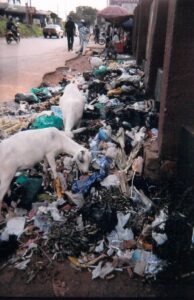
The first part of the exhibition featured photos taken as part of a photo-elicitation I conducted as part of my ethnographic work. Twenty residents of Kampala were given disposable cameras and asked to take photographs of their city. Prompted to photograph places that make them happy, relaxed, and proud, and places that make them fearful, ashamed, or uncomfortable, places that are changing quickly for good or for bad, as well as how they dispose of rubbish in the areas where they live, participants captured a side of Kampala that is rarely visually represented. After printing the images, they became the basis for a conversation, where the photographers explained what they had seen and captured. Neither a celebration nor an expose, the images showed the Kampala of everyday life, capturing the problem of waste for urban residents, and the ways that garbage is handled in low-income communities.
Integrating Small Scale Garbage Collectors
The second part of the exhibition included photographs of Didas in action collecting garbage from Banda alongside a model we developed together with Isaac, an ECOaction team member who is a designer and craftsman. The model offered one possible future for an integrated community waste management system in Kampala. It put small-scale collectors at the centre of a system that maximizes the reuse and recycling of waste materials, minimizes the volume of waste needing disposal at a sanitary landfill, and reduces the carbon footprint, fuel usage, and expense of collecting garbage, while creating new resources for use in a variety of community enterprises.
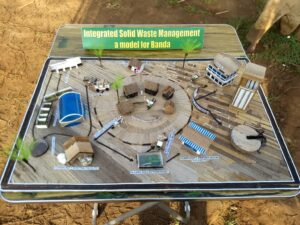
Around the world, cities are experimenting with a new way to simultaneously improve urban waste management and support the livelihoods of the urban poor. From Rio de Janeiro, Brazil to Pune, India and Addis Ababa, Ethiopia, small scale ‘informal’ garbage collectors have organized themselves in innovative new ways to demand inclusion in official solid waste management strategies, in turn, improving urban cleanliness and sanitation, while improving the livelihoods and capacities of marginalized urban populations. While not organized to the same extent, Small scale collectors are a fact of life in most Kampala neighborhoods. Recognizing this fact, this model proposes integrating them into official systems in a way that is mutually beneficial to the citizens who are their clients, government, private companies, small-scale collectors themselves, and to the environment.
The model shows the movement of waste from households, hostels, and local businesses to a community sorting facility where garbage collectors will be able to safely and hygienically sort waste into appropriate categories driven by local markets and community projects: plastic, metal, and paper recycling, urban farming, chicken, goat and other animal rearing, bio-mass briquette production, composting, and plastic bottle architecture projects. These projects bring income into the community, by linking household waste directly to industries and activities that repurpose it. The remaining waste would be taken to a skip situated at a roadside for easy collection, saving the capital-intensive trucks from time spent idling.
ECOaction Plastic Collectors
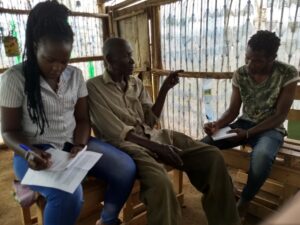
The third part of the exhibition highlighted ECOaction Plastic Collectors, new initiative that aims to foster co-operation among plastic collectors in Banda community so they can improve the services they deliver, maximize their earnings from collecting, improve their working conditions, overcome discrimination, and save money to invest in new projects and in their families’ health and education. The exhibition featured portraits and biographies of eight plastic collectors, written in collaboration with Arnold, Fiona, and Zahara, three young ECOaction members who learned how to conduct and write up life-history interviews.
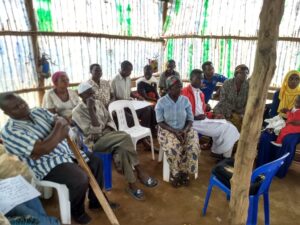
Plastic Collectors remove tons of recyclable material from the waste stream on a daily basis, providing the basic inputs for recycling factories in Kampala, protecting Uganda’s waterways and soils from plastic contamination, and reducing the global need for new raw resources. Despite their enormous contribution to the urban and the global environment, they face a number of significant challenges in their work. Foremost is the low price they receive for their collections. While at the top of the value chain, prices are set by global markets, within Kampala small-scale collectors are unable to benefit from economies of scale and so sell their materials at half the possible price to brokers. Through co-operation, ECOaction Plastic Collectors seek to overcome this challenge by gathering individuals’ collections together, collectively investing in transportation, and selling directly to factories by the ton instead of individually selling to brokers by the kilo.
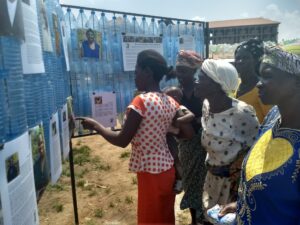
Along with these displays, staged on a mobile art gallery designed and built by the ECOaction team using recycled plastic, the exhibition also included two stunning art installations by Reagan as well as demonstrations of ECOactions other livelihood projects: an urban farm, an eco-salon, a tailoring workshop, an animal rearing project, and their signature construction projects using plastic bottles.
Trust the Process
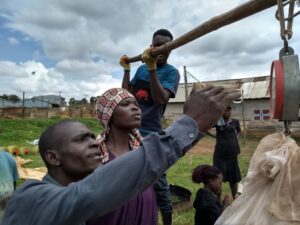
While the exhibition itself was successful – attracting an invited audience representing the municipal government, NGOs, artists, architects, educators, academics, and local community leaders – the month-long process of organizing and preparing it was the more fully engaging activity. In the build up to the event, ECOaction and I organized discussion workshops with plastic recyclers and residents of Banda, learned new skills ranging from welding to interviewing, deepened relationships among plastic collectors often distrustful of one another and between collectors and the broader community, and laid the groundwork for two new initiatives that ECOaction will develop over the coming year: a pilot project testing the uses of a co-operative model for plastic collectors and a business plan to engage in plastic construction and education projects with schools throughout the city.